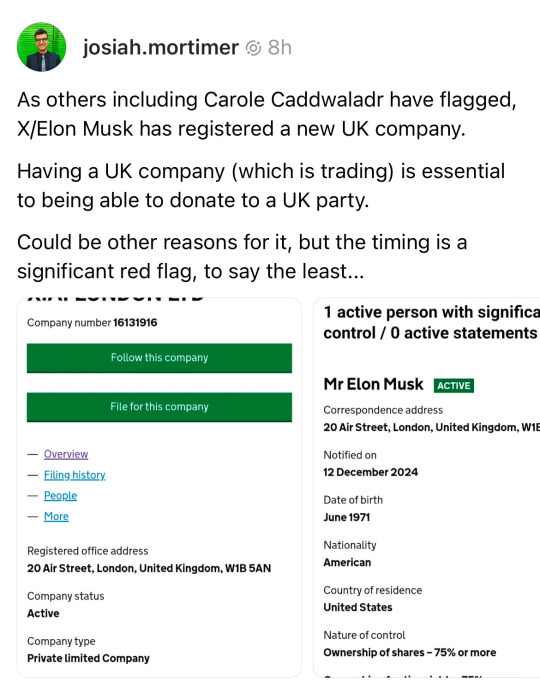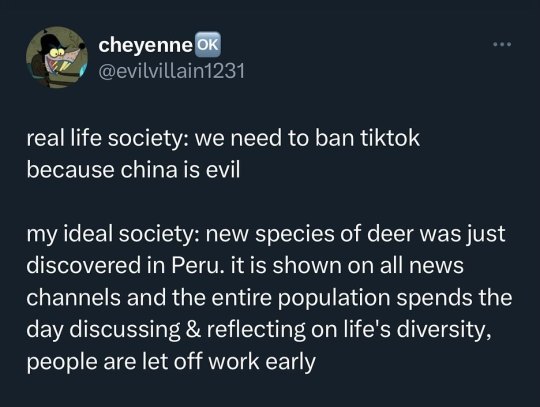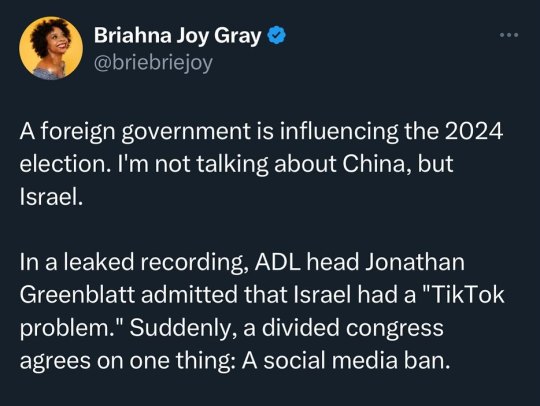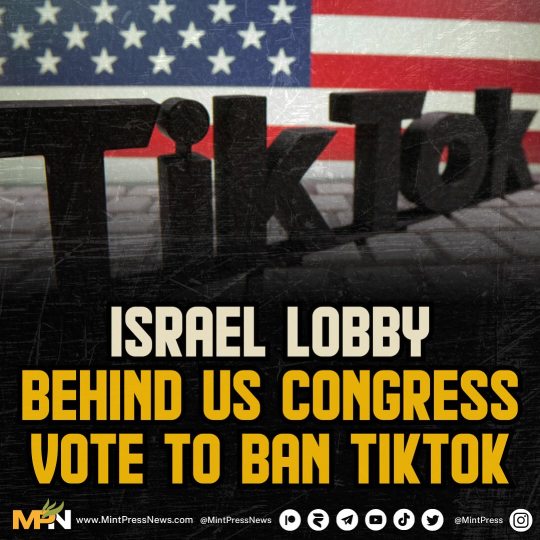#political lobbying
Explore tagged Tumblr posts
Text

155 notes
·
View notes
Text
The Impact of Extreme Wealth on Society: Unraveling the Complex Web
In the 21st century, the issue of wealth inequality has reached unprecedented levels. The ultra-rich, a minuscule fraction of the global population, possess a staggering amount of wealth, often equivalent to that of entire countries. While wealth accumulation isn't inherently problematic, the concentration of extreme wealth in the hands of a few has far-reaching consequences for society. In this blog post, we'll explore how the ultra-rich have contributed to many of the problems we face today.
Wealth Inequality: Perhaps the most obvious consequence of extreme wealth is the exacerbation of wealth inequality. The gap between the richest and the rest has grown to alarming proportions. This inequality can lead to social unrest and hinder economic growth by limiting opportunities for the majority.
Economic Disparities: Extreme wealth often translates into disproportionate economic power. This can result in monopolistic practices, which stifle competition and innovation. Smaller businesses struggle to compete, leading to fewer choices for consumers.
Social Issues: Wealth inequality contributes to a host of social issues, including reduced access to education, healthcare, and housing for marginalized communities. It also perpetuates cycles of poverty that are difficult to escape.
Power and Influence: The ultra-rich have outsized political influence. They can shape public policies to their advantage, often at the expense of the common good. This undermines the democratic principles upon which many societies are built.
Corporate Dominance: Many of the wealthiest individuals are tied to large corporations. Their influence over these entities can lead to decisions that prioritize profits over environmental responsibility or workers' rights.
Political Lobbying: Lobbying efforts by the ultra-rich can influence legislation in their favor. This can result in tax breaks for the wealthy, further exacerbating wealth inequality.
Tax Evasion: Some of the ultra-rich engage in tax evasion schemes, depriving governments of revenue needed for essential public services. This places a heavier burden on ordinary taxpayers.
Public Policy: The ultra-rich can use their influence to push for policies that benefit them financially, such as reduced regulations or favorable trade agreements. These policies may not align with the best interests of society as a whole.
Poverty Alleviation: While philanthropy is common among the wealthy, it often falls short of addressing systemic issues. Charity, while commendable, cannot replace comprehensive government programs aimed at poverty alleviation.
Social Responsibility: Extreme wealth can lead to a detachment from the daily struggles of ordinary people. This lack of empathy can hinder efforts to address pressing social and economic challenges.
The impact of extreme wealth on society is a multifaceted issue. While it's crucial to acknowledge the positive contributions of wealthy individuals, it's equally important to scrutinize the consequences of concentrated wealth and power. Addressing these issues requires thoughtful public policy, increased transparency, and a commitment to a more equitable society. By recognizing the challenges posed by extreme wealth, we can work towards a more just and inclusive future for all.
#philosophy#epistemology#knowledge#learning#education#chatgpt#ethics#politics#economics#Wealth Inequality#Economic Disparities#Social Issues#Power and Influence#Corporate Dominance#Political Lobbying#Tax Evasion#Public Policy#Poverty Alleviation#Social Responsibility
43 notes
·
View notes
Text



#israel influence#us politics#pro-palestine sentiment#pro-israel lobby#aipac#joe biden donations#illegal settlements#palestinian treatment#congressional black caucus#political lobbying#us-israel relations#social media activism#guy christensen#western narratives#political smear campaigns#election influence#tel aviv policies#high school activism
2 notes
·
View notes
Text
who'd have guessed 🙄
I can’t believe liberals were worried about fake “Russian election interference” but Israel determining US domestic policy is totally cool and fine with them 🤔" from revolutionaryth0t, 13/Mar/2024:




#tiktok#tiktok ban#us politics#us elections#palestine#free palestine#gaza#free gaza#keep talking about palestine#dont stop talking about palestine#from the river to the sea palestine will be free#i stand with palestine#rafah#save rafah#israel lobby
872 notes
·
View notes
Text
Oda: Here’s my new character! He’s a cyborg (but only on the front) who is fueled by cola that he stores in a fridge in his stomach!
Also Oda: Indiscriminate violence against a population for the actions of a few is not justice, no matter what the actions of the few entail. A ruling government built on colonialism and violence has a vested interest in rewriting the historical narrative and will do anything to protect their own version of events. This includes atrocities against citizens, including their own, if it furthers their narrative. They will demonize the survivors and victims to make them seem like villains and terrorists, and lie to the world at large. It is our job to listen to the survivors, and make sure their stories are not forgotten or distorted.
#one piece is both silly and absolutely fascinating as a history major#because fictional politics can help the audience understand real life issues#me watching the eneis lobby arc: Oh this stuff sounds familiar.#I have said it before and I will say it again: There are many horrors in being a history major.#one piece
1K notes
·
View notes
Text

#conservatives#republicans#donald trump#gun lobby#gun rights#gun violence#gun control#gun crime#open secrets#sen. ted cruz#rep. Elise Stefanik#rep. mike johnson#sen. marsha blackburn#thomas matthew crooks#us politics#news#twitter#tweet#x#gop#2024
275 notes
·
View notes
Text

This type of stuff is so fucking funny to me. As if the meat and dairy industries aren’t massive corporate powers with enormously influential political lobbies. As if these companies haven’t been dictating public policy on everything from land and water use to conservation and even what other companies are allowed to call their products. They’ve been spending millions lobbying against climate action since the 70’s, with money subsidised by our taxes, but it’s big broccoli imposing veganism on you?
I mean we have senators who are cattle ranchers passing laws about lab grown meat, and industry interests influencing EU and US spending policy. Tyson Foods alone spent $2050000 on corporate lobbying last year, and that is just what they declared. My friend they ARE the establishment.
323 notes
·
View notes
Text
I’ve given my serious takes on the importance of voting blue in this election many times over the past months (and years) and I think you can see the reasons why in so many posts across your dash right now. So I’m going to give you instead the very very unserious-but-serious argument instead.
If Trump and Vance and their goobers get into office, we’ll be shotgunned into a situation that is FAR too similar to the establishing context for the Fallout universe and does, genuinely, severely increase the possibility of nuclear conflict so unless you want to be out there in the wasteland with the knowledge that I WILL ALSO BE OUT THERE as High Elder of the Brotherhood of Steel building an idealistic organization that will inevitably have its altruistic goals corrupted into warped harmful interpretations over time… well, let’s just say I don’t think any of us want to be in that scenario. Vote blue and this insane implausible scenario will never have the opportunity to become plausible.
#us politics#politics tw#think it comes down to: who do you want your final boss to be#lady who can be politically persuaded and lobbied to take progressive action#or the frickin enclave#and as a consequence#post-apocalyptic ME#deeply unserious#but I think all the other very valid important situationally appropriate points have been made
96 notes
·
View notes
Text
Alberta’s United Conservative Party government has delivered several major changes to the province’s coal policy since taking office. These policy shifts have at times seemed abrupt — in the case of the recent lifting of the moratorium on new coal development in the eastern slopes of the Rocky Mountains, unaccompanied by official announcements. But lobbying records and corporate documents show that communication between the coal industry and government departments on the remaking of Alberta’s coal policy has been continuous and extensive. And it appears to have been influential.
Continue reading
Tagging: @abpoli @newsfromstolenland
54 notes
·
View notes
Text

#grace hurford#political twitter#jo maugham#political lobbying#good law project#uk news#uk politics#conservative party
38 notes
·
View notes
Text
Saw a comic today that was like "a GOOD union trusts its membership to always act in their own best interest and to always fight capitalism, unlike those bootlicking liberal unions who believe in things like "reform" and "politics"
I can't even trust my union's membership to show up to work sober, man. Half of them are currently salivating over the concept of the supreme court gutting OSHA. I don't think they're going to go for a revolutionary overthrow of capitalism and I don't think I'd trust them with it if they did
#the comic clarified that liberal unions 'prioritize lobbying too much'#but that fighting unions 'fight hard for better wages and conditions'#so . . . what are the liberal unions lobbying for do you think. why do you think lobbying for governmental protection of all workers' right#is less important than a strike action that lets you negotiate a single contract in a single industry. what is this dichotomy#the other aspect of the 'fighting' union was 'believes in the transformative power of the working class'#like. okay. i'm believing really hard. so did you have any action to back that up or would that be too liberal for you#us politics
77 notes
·
View notes
Text
There’s been a lot of talk lately about how tariffs raise prices, and that’s good, but there hasn’t been enough talk about how across-the-board tariffs create massive opportunities for corruption.
#Trump can give exemptions from the tariffs to whatever company he likes#So of course people in his orbit will lobby him to exempt companies they have stakes in#And it’ll work since Trump is really easy to manipulate#as his first term made quite clear#crony capitalism#us politics#politics#tariffs#trump#Donald Trump#corruption
21 notes
·
View notes
Text
#israel#uk#politics#tory#nasty party#ukpol#conservative party#general election#corrupt#payments#bought#lobbying#lobbyists#genocide
42 notes
·
View notes
Text
US - INVESTITURE PRÉSIDENTIELLE : DES MANIFESTANTS GAUCHISTES ANTI-TRUMP ONT INSTALLÉ UNE GUILLOTINE DEVANT UN DRAPEAU LGBTQ À WASHINGTON ⚠️⚠️
Pendant 4 ans au moins, ça va pleurer dans les chaumières gauchistes progressistes.
#donald trump#president trump#trump#potus#47th president#january 20th#gauchisme#leftist#leftism#lgbtqiia+#lgbtqia#lgbtq#lgbt#lobby#lobbying#usa#usa news#usa politics#usa president#woke liberal madness#wokism#wokisme#woke
17 notes
·
View notes
Text
Alabama Senate Bill 23 would make it a Class C felony to manufacture, sell or distribute cultivated meat. The bill passed the Senate without opposition and moved to the House.
The bill was sponsored by Sen. Jack Williams, who is a cattle farmer.
104 notes
·
View notes
Text
In an era of equal rights, some chose to go backwards...
Ahead of the vote, a group of 25 Senate Republicans introduced legislation — the No Official Palestine Entry (NOPE) Act — that would prevent US funding from going to the United Nations and other organizations that grant the Palestinians “any status, rights, or privileges beyond observer status.”
#palestine#palestinians#unga#un membership#gaza#west bank#rafah#state of palestine#united nations#israeli atrocities#israeli apartheid#israeli occupation#genocide#war crimes#ethnic cleansing#free palestine#free gaza#justice#idf terrorists#iof terrorism#humanitarian crisis#gaza solidarity encampment#us campus protests#support for palestine#anti genocide#republicans#us politics#israel#aipac#pro israel lobby
33 notes
·
View notes